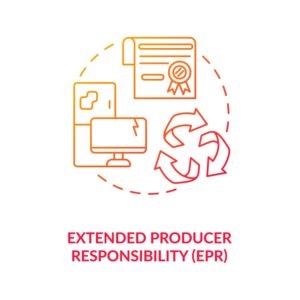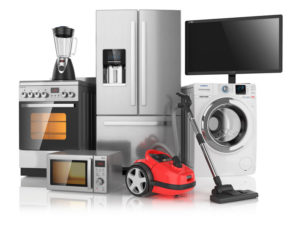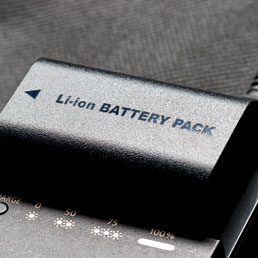
Extended Producer Responsibility (EPR) is about ensuring that companies that manufacture, import and sell these products are accountable for their environmental impacts at the end of their life.
The regulations require companies to minimize the waste generated by these products and encourage their reuse. The EPR is designed to get manufacturers to develop products that reduce material consumption and improve reusability and recyclability.
(Online) retailers are subject to numerous complex recycling regulations in each shipping destination worldwide. These include obligations to register, report quantities and take back the products they place on the market. In addition, different regulations apply to participation in take-back systems. In this article, we focus on the market in the UK.
If you are exporting to the UK, then the big challenge for is to keep track of the legal requirements for EPR regulation. We would like to make this work easier for you. Therefore, here you will get an overview of which legal regulations you are directly affected by in the UK, how to implement them and what penalties you might face. Broken down by WEEE, batteries and packaging.
Extended producer responsibility – WEEE
Obligated to report electrical and electronic equipment are manufacturers who place products on the market for the following places of use:
Private household
Professional use
Photovoltaic systems
Below are the categories for which the EPR applies in the UK. For these categories, you will need to provide Amazon with the appropriate registration number(s), for example.
- Cat. 1: Large household appliances – e.g. washing machines, floor heating, electric furniture, gas boilers.
- Cat. 2: Small household appliances – e.g. vacuum cleaners, irons, bicycle lamps, switches
- Cat. 3: IT and telecommunication equipment – e.g. PCs, fixed GPS, USB sticks, SIM cards
- Cat. 4: Consumer electronics – e.g. TVs, hi-fi equipment, non-fixed car entertainment
- Cat. 5: Lighting equipment – e.g. household lights, lights with motion detectors
- Cat. 6: Electric and electronic tools (except fixed large industrial tools) Electric fences, pumps, filters and fountains for garden ponds
- Cat. 7: Toys, recreational and sports equipment – e.g., fitness equipment, game consoles, e-cigarettes
- Cat. 8: Medical devices – e.g. blood measuring devices, hearing aids, X-ray machines
- Cat. 9: Monitoring and control devices – e.g. smoke detectors, thermostats and heating controllers
- Cat. 10: Automatic dispensing devices, vending machines – e.g. hot beverage dispensers and money dispensers
- Cat. 11: Display screen devices – e.g., televisions, information boards
- Cat. 12: appliances containing refrigerants – e.g. boilers containing refrigerants, heat pump, clothes dryer
- Cat. 13: Gas discharge lamps and LED light sources- e.g., motion sensor or programmable speaker smart lamps
- Cat. 14: PV modules (solar panels) – All PV modules are EEE products.
Manufacturer obligations

For the purposes of the law, a manufacturer is any person who first places a product on the market. These include: Manufacturers, dealers, distributors, foreign companies with a branch and direct shippers. As a manufacturer, some obligations must be fulfilled:
- Registration obligation
- Obligation to take back
- Obligation to join
- Information obligation – reuse and proper treatment within 1 year
- Manufacturer registration number for your dealers
- Keep proof of quantities for at least 4 years
Provide information on the reuse and environmentally sound treatment of products and components (including materials, hazardous substances and preparations) within one year of placing them on the market. Manufacturers must ensure that the distributors you supply have your manufacturer registration number. Records of the quantity of EEE placed on the market by category must be kept for at least 4 years.
International trade, international obligations: Outsourcing pays off
Deutsche Recycling supports you with national and international recycling legislation, with services flexibly tailored to your products and regions with a focus on packaging, batteries and electrical appliances.
Extended producer responsibility – batteries & accumulators
Unlike WEEE, there is not a large number of categories. For batteries and accumulators, a distinction is made between:
- Portable – Batteries under or up to 4 kg incl. Integrated batteries e.g. in laptop, cell phone.
- Automotive (not e-mobility) – for starting/igniting a vehicle engine or for lighting a vehicle
- Industrial – battery from 4 kg – exclusively for an industrial or professional use
Manufacturer obligations
The following obligations apply to National First Distributors (manufacturers, dealers, distributors, branch):
From 1 ton
- Duty to take back
- License obligation
 Under 1 ton
Under 1 ton
- Obligation to register and report quantities
Voluntary acceptance by companies from other countries without their own branch is not possible. You are obliged to take back used industrial batteries from every end user free of charge,
- if you supply him with new batteries
- if they are batteries of the same chemistry that you place on the market
- if they cannot be returned to another manufacturer
In addition, manufacturers must provide end users with information on how to return spent industrial batteries, e.g. through information on the website.

Compliance Check: Request now!
We check whether your company meets the legal requirements, whether processes need to be adapted and whether costs can be optimized.
With the Compliance Check from Deutsche Recycling, you are on the safe side: You can avoid warnings and the threat of fines.
Extended producer responsibility – packaging
 Manufacturers of packaging for private use (B2C) as well as for commercial use (B2B) are obliged to report packaging.
Manufacturers of packaging for private use (B2C) as well as for commercial use (B2B) are obliged to report packaging.
Packaging is defined as material for holding, protecting, handling, delivering or presenting goods:
- Pallets
- Boxes
- Sacks
- Adhesive tape
- Rolls
- Hoses
- Clothes hanger
Manufacturer obligations
National first marketers (manufacturers, dealers, distributors, branch) at the competent environmental authority have the following obligations:
- Annual registration requirement until April 7
- Obligation to take back and recycle
- A Certificate of Compliance (CoC) must be submitted to the authority by 31.1. of the following year.
- provide proof of fulfillment of the obligation
These obligations exist only from 50 t of packaging placed on the market and a turnover of more than 2 million GBP per year. Voluntary acceptance by companies from other countries without their own establishment instead of the distributor is not possible.
Labeling obligations
For devices:
As of 01.10.22, a UK address must be given on food packaging. For companies without a UK registered office, the address of the UK importer must be given.
From 01.10.22 indication of origin on food “UK” or “Non-UK”.
From 1 January 2023 UKCA- label replaces product safety markings used before “Brexit” such as CE marking.
On accompanying documents:
No labeling or information requirement
Special rules in Northern Ireland:
Because Northern Ireland remains in the EU Single Market and Customs Union, EU rules still apply. Any changes depend on announcements by the British government and must be confirmed by the British Parliament.
Sanctions and penalties
- Sanctions and civil penalties: enforcement undertaking
- Variable fines: depending on the violation, up to 250,000 GBP
- Criminal prosecution: only for the most serious violations (intentional / negligent)Penalties
Violation of the registration, take-back and recycling obligation threatens criminal prosecution with fines depending on the type and severity of the violation.
Civil penalties – costs avoided in the past due to non-compliance are calculated and paid as a donation to an environmental organization.
Planned changes and extensions for 2023
In 2021, the government held debates to amend the Packaging Ordinance, which concluded in June 2021. These culminated in the Electronics and Electrical Equipment (EEE) reform in November 2021, with the results of both debates expected in early 2022. Another debate on battery regulation was expected to be held before the end of 2021, but was delayed.
The debate on EEE is expected to cover a wide range of proposed improvements, including data and reporting systems, deterring and punishing free riders, increasing collections, and improving product life cycles of EEE.
The introduction of a system for batteries also needs to be discussed. Here, the issues to be addressed are how to reduce the number of portable batteries that end up in landfills, how to recycle batteries from electric vehicles, and how to deal with different types of lead-acid.
In the December 2015 Resources and Waste Strategy Paper, DEFRA (department for environment, Food & Rural affairs) also set out its intention to add up to five new waste schemes to the UK EPR framework by the end of 2025.
The following additional EPRs are to be introduced:
- Textiles, including clothing and commercial textiles (2023)
- Fishing tackle (2022)
- Vehicle tires (2023)
- Construction and demolition materials (2025);
- Bulky waste, including mattresses, furniture and carpets.






